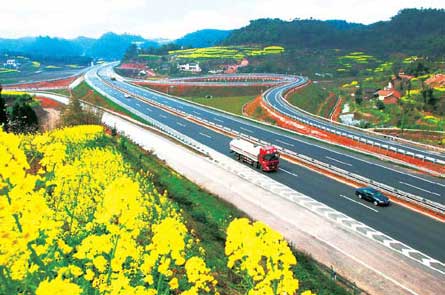Economic surge in post-quake Sichuan
By Zhuan Ti (China Daily) Updated: 2012-05-26 14:15
|
 |
|
The length of new expressways and railways in Sichuan under construction or open to traffic both rank near the top in China. |

After the nation's "go west" strategy to increase inland development was formulated by the State Council in 2000, Sichuan province became an increasingly important economic growth engine in western China.
But less than a decade after the policy was released, a massive earthquake struck the region in 2008. People from different walks of life at home and abroad responded with a miracle in relief and reconstruction.
With rebuilding basically complete, the quake zone has seen unprecedented changes.
Sichuan is now the fastest growing of the major economic provinces in the country, said Deputy-Governor Gan Lin.
Over the past four years, its GDP doubled to more than 2 trillion yuan ($317 billion), enabling its per capita GDP to surpass $4,000.
It is the first province in western China to pass the trillion-yuan GDP benchmark. Its aggregate economy now ranks first in western China.
With economic strength ranking eighth nationwide, Sichuan has turned from an economically large province in western China to an economically strong province nationwide, Gan said.
More than 200 Fortune 500 firms now have operations in Sichuan. The 2013 Global Fortune Forum will be held in its capital Chengdu.
The province has also drawn increasing numbers of investors due to its comparative advantages and sound investment environment, the deputy-governor said.
Its aggregate economy and retail sales each account for about one-quarter of the total in western China. The province has a strong influence on markets in western and central regions of the nation.
It tops the list of choices when successful domestic and foreign companies decide to expand into western China, Gan said.
Its traditional industries include electronic information, equipment manufacturing, energy, electricity, oil, gas, chemicals, vanadium, titanium, steel, beverages, food and modern traditional Chinese medicine.
Its key industrial parks have complete support facilities and a high degree of openness. It has over 40 industrial clusters with more than 3,200 enterprises backing the rapid industrial development.
Also booming are modern service sectors including service outsourcing, retail sales, financial services and modern logistics, Gan said.
It now accelerating construction of expressways and railways, while Chengdu's Shuangliu International Airport is the country's fourth largest national aviation hub.
The province has 94 institutions of higher learning and more than 650 vocational and technical schools that together graduate more than 500,000 students each year. It has over 20 million surplus rural workers that ensure the staffing needs of enterprises, according to Gan.
The clearance efficiency of the Chengdu Customs is among the highest in the country. The overall cost of business operations in the Chengdu Hi-tech Comprehensive Bonded Zone is about 30 percent lower than in coastal regions.
- IMF's review on inclusion of yuan in SDR basket underway
- IMF official says China's growth slower but safer
- Heiress harmonizes hot pot with organic farming
- Lock-up shares worth 34.5b yuan to become tradable
- China aims to make RMB more freely usable
- Domestic brands' SUV sales surge
- The grass is not always greener on the other side
- Initiative puts travel on right track

















